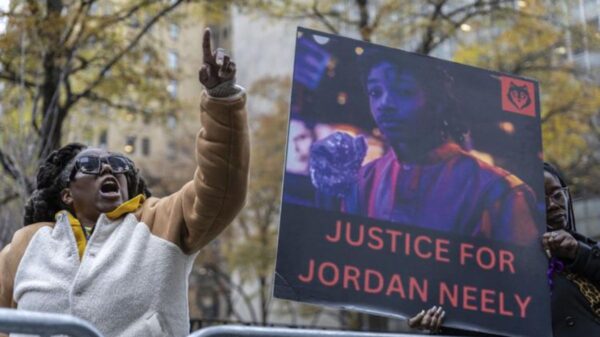By Marc Morial
“His mental illness screamed of profits prioritized over people. … His Blackness disquieted the American ideals and sensibilities that proclaim us all equal. His existence, on that train, on that day, exposed just how poorly America cares for her people and how poorly we care for one another.” — Brittany Packnett Cunningham
One man faces charges of criminal manslaughter, but Jordan Neely’s death had many accomplices.
Ignorance and fear of mental illness. Implicit racial bias. A desperately inadequate health care system. Reckless and distorted political rhetoric about violent crime.
Jordan Neely didn’t fall through the cracks. The world where he existed is nothing but cracks.
Neely’s short, tortured life ended in the 15 minutes Daniel Penny gripped him in a chokehold on a New York City subway. But as a severely mentally ill Black man in America, Neely spent most of his adult life at risk of a violent death.
Most Americans experiencing a serious physical health crisis in public can expect to end up in a hospital, receiving treatment. An American experiencing a mental health crisis is far more likely to end up in prison — or killed at the hands of emergency responders. Black Americans with mental illness are even more likely to face a tragic outcome.
Penny’s lawyers claim he was acting in defense of himself and his fellow passengers. Whether he truly feared for their safety or simply was irritated by Neely’s disruptive behavior is unknown. The risk of being assaulted in the New York City transit system is minuscule, and the chance an assault will be committed by someone experiencing a mental health crisis even smaller.
Neely did have a history of violent behavior, but Penny could not have known that in the moment that he tackled him. Statistically, the passengers on that F train were as likely to be assaulted by any other passenger as by Neely. Fear often is irrational, however, especially when it is compounded by implicit racial bias and deliberately fanned by unprincipled politicians who distort and exaggerate the risk of crime for their own benefit.
Whether Penny was justified in restraining Neely in that moment is a fair question for debate. Less ambiguous is the question of whether he did it in a reasonable manner. As an ex-Marine, Penny almost certainly was trained in the responsible use of a chokehold. Crushing a man’s windpipe continuously for 15 minutes — long after his body had gone limp — is neither reasonable nor responsible.
At least one passenger warned Penny, “You’re going to kill him.” And when a bystander tried to revive Neely, Penny waved him off.
The rush to demonize a Black victim of deadly violence has long been standard operating procedure in the United States. The public learned about Neely’s lengthy arrest record before we even knew his name. The rush to glorify the white perpetrators of violence is not a surprise either. We knew that Penny was aMarine Corps veteran before we knew his name.
The celebration of vigilante killers, commonplace in the dark era of Jim Crow, is making an alarming comeback. Penny is being hailed as a hero, as areDaniel Perry and Kyle Rittenhouse, who fatally shot Black Lives Matter protesters, and Mark and Patricia McCloskey, who threatened to do so.
Rewarding and encouraging vigilantism is a path to ruin, but it’s simpler and easier than confronting the uncomfortable questions that Neely’s tragic life and brutal death have raised about mental illness, homelessness, and violent crime. For as long as a New York City task force has kept a list of the most severely troubled homeless people, Neely has been on that list, but instead of getting the treatment he needed, he was arrested 42 times in eight years. More than 70% of prison inmates have a diagnosed mental illness or substance abuse disorder, a third of them seriously mentally ill. The cost — both human and financial — is astronomical.
Anyone who’s been confronted with the erratic behavior of a person experiencing a mental health crisis knows the helpless desire for someone to do something to make it stop. None of us want that “something” to be deadly violence.
Morial is president/CEO of the National Urban League.

You must be logged in to post a comment Login